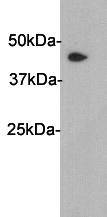PAI-3 also called Protein C inhibitor (PCI) was originally described in plasma as an inhibitor of the anticoagulant serine protease activated protein C. PCI is present not only in plasma, but also in urine and in many other body fluids and secretions. The highest PCI concentrations have been described in seminal plasma (?200 μg/ml). The inhibition is regulated by glycosaminoglycans, such as heparin and heparan sulphate, and several polyanions. As well as its roles in the regulation of hemostasis and fertilisation, Protein C Inhibitor is involved in cell inflammation, proliferation, apoptosis, tumor cell migration, invasion, and metastasis.

